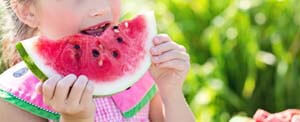Top 5 Foods That Could Positively Affect Your Child’s Mood
A British comedy film released in 1950, entitled The Happiest Days of Your Life, features an amusing plot twist. During the Blitz, girls at an exclusive London school are mistakenly evacuated to a school for boys in the English countryside. More recently, British comedian Paul Merton commented: “My school days were the happiest days of my life; which should give you some indication of the misery I’ve endured over the past twenty-five years.”
As a grownup, you can probably identify with the idea that school days are blissfully happy, free from adult concerns. However, being in school today is not necessarily a carefree experience. For some young people, anxiety about exams or experiences of being bullied affect their lives negatively. Then there are the more intangible yet universal stresses of growing up that arise from simply trying to fit in or deal with changes triggered by adolescence.
Mood swings are one important indicator of children who are worried or feeling stressed.
Moods and foods
The science of how food affects your mood is based on the knowledge that dietary changes can alter your brain structure, both psychologically and chemically, which may, in turn, lead to altered moods and behavior. For families living in or moving to Singapore, the Australian International School (AIS) offers a well-thought out catering provision, which means that your children enjoy nutritionally balanced food options at every stage of their education. This encourages them to engage in healthy eating habits as they grow.
For example, particular foods that are known to be beneficial for your children’s moods include:
1. Salmon
2. Organic eggs
3. Whole grains and oats
4. Dark leafy greens
5. Legumes
You will also find that eating berries and drinking plenty of water has very positive effects and can help your children be happier and more productive and in Singapore’s equatorial climate, staying hydrated is a must….which is why you’ll rarely see a student at AIS without a water bottle to hand.
Salmon and oily fish
Salmon contains a form of Omega-3 called DHA, and also a range of B vitamins, which scientific studies have shown is vital for brain development in children. It’s also known to support learning abilities. The same can be said of tuna, mackerel and fish oils in general. Salmon is a natural mood enhancer and may reduce the risk of depression. It’s a rich source of quality amino acids and protein, thus helping to regulate appetite and sleep patterns.
Organic eggs
Protein contains various amino acids that increase specific hormone levels such as epinephrine, dopamine and nor-epinephrine. These will help you and your child to feel alert, energized, and positive. Besides the focus on eggs, you should also encourage your child to eat low-fat dairy products like beans, lean cuts of meat and tofu, to make sure they get adequate amounts of protein.
Whole grains and oats
The amino acid tryptophan is present in many whole grains. It occurs naturally and your body needs it to produce melatonin and serotonin. Serotonin is well known as the feel-good hormone, which improves mood and relaxes your body as well as your brain, while melatonin helps establish and maintain regular sleep patterns. As a mood booster, oats are effective because of their low glycemic index (GI) and the mineral selenium. This means they release energy into the bloodstream slowly, so you and your family can avoid the kind of blood sugar rush that often descends into irritability.
Dark leafy greens
While there are mood-regulating substances such as dopamine in organic eggs and serotonin in whole grains, dark leafy greens such as spinach contain both and are additionally rich in folate. In fact, all dark leafy greens (think broccoli and chards) are great for calming kids’ nerves, as are fruit and many other vegetables, with the exception of dried fruit and fruit juice.
Legumes
Beans of all kinds are remarkable when it comes to better physical and mental health. Choose from black beans, chickpeas, lentils, split peas or kidney beans, to name just a few, that are packed with nutrients. These will help your child benefit from increased levels of calcium, copper, folate, iron, magnesium and zinc, thereby improving their mood.
Chartwell’s unique Smart Food Program in the AIS school canteen follows the ‘Fresh Food First’ philosophy, offering the very best of fresh seasonal produce and a great range of options.






